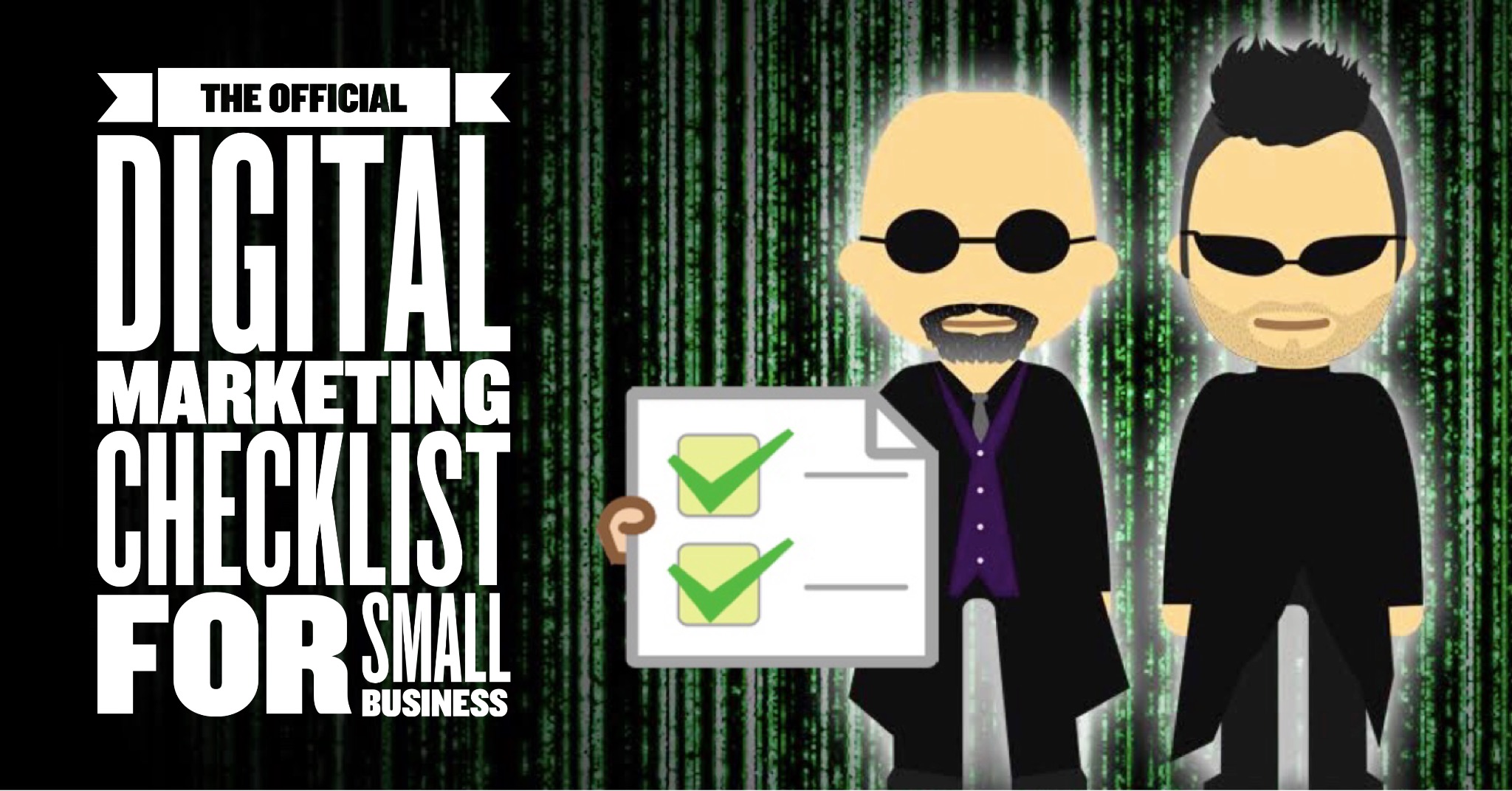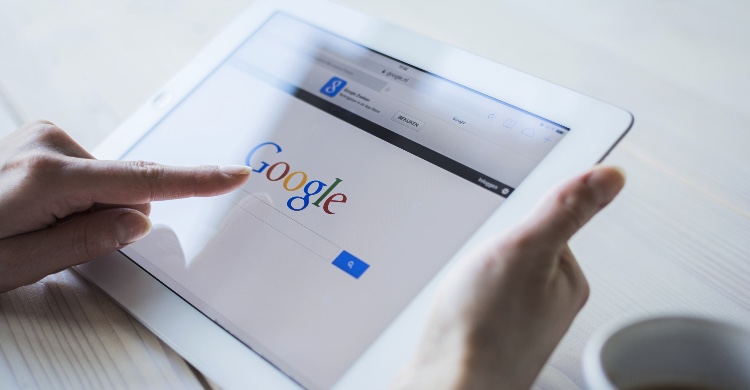
Podcast: Play in new window | Download
Take the red pill, and you can keep reading this post.
Or take the blue pill, leave this site, and stay in wonderland forever.
Well…that's a little dramatic, I guess.
But one of my top 5 movies, and I'm a big dork. Plus it's my site. 🙂
But seriously, digital marketing is an important tool to use no matter what kind of business you have.
However, digital marketing is something overlooked by many local businesses.
Founder of RetailMinded, Nicole Leinbach-Reyhle wrote in an article for Forbes:
Many businesses, particularly those that don’t actually sell anything online, often complain that there’s not enough time in the day to “do it all” and as a result, online marketing gets shoved to the side. Unfortunately, this isn’t how customers make decisions. The reality is consumers – likely even you – turn to the internet to discover what to do, where to go, who to buy things from and more. (@RetailMinded)
Now that you understand why digital marketing is so important to your local business, read below to learn ways to easily incorporate it into your marketing strategy:
1.) Create a Professional Site

You would think it would go without saying that your site should be professional and helpful.
However, there are so many sites out there that don’t have basic things, such as the business’s hours or location. This is just silly.
You want customers to find you, and your website is one of your biggest tools to make this happen.
We are loving Thrive Themes. Super easy to use, and very professional right out of box.
If you like this site, you can grab the template we used here.
2.) Keep Information on Your Site Up-To-Date

Make sure you provide an easy-to-navigate site that prominently features your business hours, locations and what you sell.
Also, make sure you keep those numbers and addresses up-to-date. There is nothing more aggravating than someone driving across town to find your business has moved.
Your site should also provide multiple ways to contact you.
A phone number, your social media account and an email address are just a few examples.
Finally, don’t forget the all important call-to-action.
Customers visiting your site should leave knowing why they would want to do business with you. They should also know how to take the steps necessary to get in touch with you or to come by your business.
3.) Mobile Friendly Website

If your website isn't responsive or mobile-friendly yet you are probably losing opportunities to your competitors.
As of July 2015, over 51% of Internet traffic in the United States now comes via mobile devices (mostly smart phones). That means many customers and prospects are likely having a poor experience with your brand, as non-mobile friendly websites are very difficult to browse from a phone.
Melanie Franke, in an article for GoDigital explains:
Small business owners may not be feeling an immediate sting from this, but the potential losses will only grow as more and more consumers demand effortless and easy-to-use experiences, no matter what devices they’re using and what channels they’re shopping in.
To top it off, nearly half of consumers say they won’t return to a mobile site if it doesn't load properly on their device. That gives your mobile-savvy competitors the chance to scoop up your potential customers. (@Melanie_Lewis)
Making matters even worse, Google started penalizing non-mobile friendly websites back in April of last year, so if your not mobile-friendly yet, your website's ranking on search results pages has probably dropped – meaning your businesses visibility and lead generation has also dropped.
If your organization doesn't already have a mobile responsive web design, you better get one quickly.
4.) Don’t Forget the Landing Page

Another thing to remember is the importance of landing pages. This is the first impression your visitors will have when clicking on your site.
You want to make sure that it is the best page of all with regard to local needs or wants.
Again…Thrive is awesome. This video shows their landing page builder that makes cranking out landing pages easy and fast.
We did this landing page with it. And this one. And this one. And this one too.
I cranked each of those out in about 10-15 minutes.
With an easy builder like this, you remove the fear of landing pages taking a lot of your time, or having to work with an outsourcer.
Since it's easy, you just create one for almost everything. And get many more email addresses on your list
5.) Utilize Social Media/ Post Regularly

Social media is a huge tool you should use as a local business owner.
Keep in mind; however, it does no good to have a Facebook account if you don’t actually post on it regularly. Not every ten minutes, though. You don’t want to annoy your followers.
Make sure you regularly post helpful content or links to your site where you have interesting content ready for your customers, or audience, to enjoy.
According to a great article in Social Media Examiner by Kristi Hines:
The most important way to use your Facebook page for business is to engage with your audience. Your audience is composed of a variety of people–fans of your content, fans of your business, potential customers, current customers and former customers. With this in mind, create posts and content that engage these groups of people.
The traditional rule for audience engagement is 80/20. Eighty percent of your content should be for your audience, and 20% should be for your business (sales, marketing, self-promotion, etc.).
This means that the majority of your posts should be aimed at getting your audience to engage with your page. You can do this by encouraging audience participation and sharing content relevant to your niche or industry.
You want it to be helpful to them. For example, if you are a real estate agent, posts with tips on how to easily increase the value of their homes.
Social Media Post Ideas
6.) Provide Solutions, Use Multimedia
Provide ways your business can help with your audiences’ problems.
Also, don’t avoid multimedia posts.
Videos can be a great way to communicate your message, and showcase clear solutions to a common problem.
While video may seem like an expensive trend that is out of the grasp of many small businesses, it can be an inexpensive and effective marketing tool for even the smallest business.
Today, if you have a smartphone, you can make a great marketing video. A one-minute video highlighting the things that make your company unique could become your best customer acquisition tool.
We also recommend repurposing your content. Or
You can download our Content Repurposing Mindmap here, then listen to this episode of the podcast that walks you through the entire process step-by-step.
7.) Maximize Marketing Budget

If you are on Facebook or just trying to get your site viewed through the use of paid tools, you want to make sure you are focusing on the right people.
You don’t just want reads and visits, you want conversions.
One of the best ways to get high conversion from Facebook paid ads is to target the right crowd.
Justin Brooke, is one the smartest dudes on this topic, and shares some great insights in this article. Including this:
One of the major benefits of using custom audiences is another feature called ‘Lookalike Audiences.’
And here’s how you can use it to your advantage.
When you upload names into Facebook it looks at who those users are, and uses an algorithm to look at what their Facebook profiles look like.
Their algorithm takes into consideration all the things those people are interested in and then Facebook says, “Oh, here’s all the other people that look like your audience.”
So you can basically take your ‘Buyers’ list and then tell Facebook, “Go find me all the other people that are like these people.”
And then you can advertise to a group that is more likely to be just like your buyers and buy your product.
See…told you he was smart. 🙂
There is also a way you can do some really slick targeting on Twitter that we covered in this post.
8.) Use Google Wisely
There are a few ways you can get Google and similar platforms to work for you. One is by using their algorithms to your advantage.
Google actually allows businesses to target locally. Just be sure to incorporate locally optimized keywords into the content on your website.
If you own a local ice cream parlor in the town of Ringgold, Georgia, it does you no good to advertise to people states away in Alabama.
However, by using locally specific keywords, you can make sure those who are within driving distance will find you.
An example of good keywords for this would include something like “ice cream treats in Ringgold,” or “ice cream parlor in Ringgold.” These both use local keyword phrases that would be known by locals but not by anyone states away.
In an article about local SEO trends, Jeff Bullas points out why “voice search” is something to pay attention to also:
With the rise of mobile devices we have seen a greater demand for voice search. Studies shows that 56% of on the go searches have local intent.
When using voice for search, people usually use natural language as opposed to keywords.
For example you might say OK Google … “Where can I find a good locksmith in Richmond?” – but if you’re on the desktop version you might have typed in “locksmith Richmond”.
Voice search is changing the way people search. You should make sure your business has a content strategy to target long tail keywords and informational queries with things like How-To articles, explainer videos and so on.
9.) Evaluate Your Marketing Strategy

As you seek to incorporate digital marketing into your localized marketing strategy, you want to make sure you keep up with its effectiveness.
After all, there is no sense it doing the same thing over and over if it isn’t working.
Therefore, be diligent about checking your results. If there haven’t been any local hits on a specific keyword phrase, you need to change it.
The main thing is to keep up with the effectiveness of your marketing strategy and make changes when needed.
Marketing isn’t a one shot deal. It is fluid and requires constant changes and adjustment.
10.) Work on Google Results for Your Name

By creating new content, you give Google’s algorithm new, relevant content about you that will rank highly in search.
The type of content you create will depend on your profession and the time you can devote, but some ideas include a personal site, social media bios, press releases, videos, guest articles and blog posts.
One of my favorites is to syndicate a quarterly news release on a premium network.
11.) Use Local Tools/Monitor Online Reviews

Sites like Google and Yelp allow you to post information about your business online.
Be sure to claim your listing so you can control the information they are giving out.
Another aspect of this and your presence on social media is the fact that you will begin getting reviews.
They won’t always be good either. In fact, your business will almost certainly draw some negative reviews.
You need to respond to any and all bad reviews in a timely manner.
This means you have to continually monitor your online presence and reviews.
Apologize and acknowledge the person’s bad experience when you respond to a poor review.
This shows you are a professional and hold yourself to only the highest standards. Never get into a petty bickering match with a customer, though. It does no good and only undermines your professional image.
Take what you can from the negative reviews.
For example, a bad review might highlight an area you haven’t realized was a problem. This gives you the opportunity to correct said problem and as a result improve your business.
It’s also a good idea to encourage positive feedback or reviews from pleased customers. Do this by making it clear how guests can leave their positive feedback.
13.) Get Mentioned In The Local Media

As a marketing consultant, you likely focus on social media, SEO and email campaigns. But do ever think about how to get local media coverage for clients, too?
While these are traditional marketing methods are great to develop your client’s brand, and get them in front of their target audience, you shouldn’t dismiss the effectiveness of local news.
Using social media, its easier than ever to get featured in local media. You can quickly reach reporters, producers and journalists right from their Facebook pages or Twitter accounts.
We did a whole show about that recently, and you can listen to it here.
14.) Write a Short Book Positioning You As An Expert

We call this a “1-Problem/1-Solution Book”.
You're probably thinking, “I don't have time to write a blog post…much less a whole book!”
Well, the purpose is NOT to create the Ultimate Guide to XXXXX. Those are daunting and rarely are completed.
Instead, publish a 30-50 page Kindle book on how your prospects can solve a very specific problem.
Here is the podcast episode we did on that topic.
Putting the customer first is crucial to business success no matter your field or marketing strategy.
This is just as true in digital marketing.
So, make sure you treat your customers right.
Display your online presence in your business, and encourage repeat business and positive feedback. This along with all the points listed above will ensure you use local digital marketing to its fullest.

